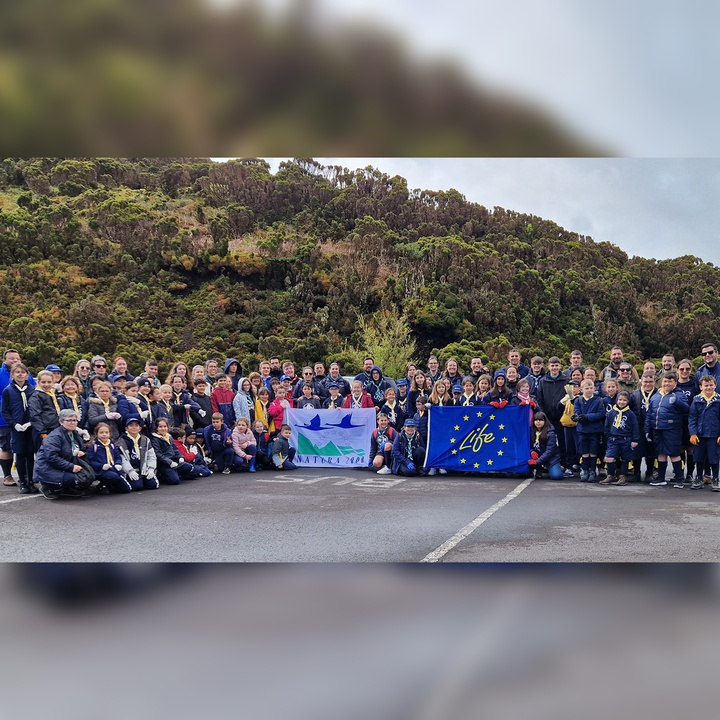Text size:
News

Azorean Government promotes volunteer actin to restore natural habitats at Algar do Carvão and Furnas do Enxofre
April 9, 2024
Last Saturday, the Regional Secretariat for the Environment and Climate Action, Alonso Miguel, participated in a volunteer initiative to recover and preserve natural habitats at Algar do Carvão and Furnas do Enxofre, on the island of Terceira, in collaboration with the National Scout Corps – Terceira Centre.
The initiative, organised by the Regional Secretariat for the Environment and Climate Action as part of the LIFE BEETLES project, was attended by around 240 scouts from eight groups on Terceira island, who had the opportunity to remove invasive plants and plant specimens of endemic species, such as Firetree (Morella faya) and Azorean Laurel (Laurus azorica), as well as the stacking of wood to create a habitat for one of the project's target species, the Ground Beetle (Trechus terrabravensis).
Alonso Miguel emphasises that LIFE BEETLES “is a nature conservation project that aims to increase the population size, distribution area and conservation status of three species of beetles endemic to the Azores, the Ironclad Beetle (Tarphius florensis), on the island of Flores, the Ground Beetle (Pseudanchomenus aptinoides) on the island of Pico, and the Ground Beetle (Trechus terrabravensis) on the island of Terceira, which represents an investment of around 1.76 million euros, 55 % subsidised by the European Union, to be carried out over six years”.
The Regional Secretary explained that “the work planned for Terceira island, under the LIFE BEETLES project, covers an area of around 107 hectares, to control the spread of invasive plant species in pristine areas of habitat for the target species and to proceed with the conversion of eucalyptus plantations into patches of Laurel Forest”.
“In the eucalyptus forests of Algar do Carvão and Furnas do Enxofre, which represent two of the project’s five areas of intervention on Terceira island, interventions have been underway since 2020 with the aim of renaturalising alien eucalyptus forests by planting endemic species, converting them into native forests, thus creating ideal habitat conditions for the Ground Beetle,” he added.
Alonso Miguel pointed out that “as part of this renaturation process, in these two areas covering around 16 hectares, around 4,500 eucalyptus trees have already been removed and eliminated, work has been carried out to control invasive species such as the Kahili Ginger (Hedychium gardnerianum) and the Elmleaf Blackberry (Rubus ulmifolius), as well as implementing natural engineering solutions, i.e. based on nature, to stabilise slopes.”
“So far, these two areas have planted around a thousand specimens of endemic species, such as Azorean Heather (Erica azorica), Azorean Laurel (Laurus azorica), Azorean Viburnum (Vibrunum trelasei), Azorean Holly (Ilex perado subsp. azorica), Azorean Picconia (Picconia azorica) and Firetree (Morella faya),” added the Regional Secretary.
Alonso Miguel highlighted the more than 250,000 euros the Azorean Regional Government invested in carrying out the work in the intervention areas on Terceira island, namely in hiring human resources and purchasing equipment fundamental to the project, such as chainsaws, drills, and an autonomous caterpillar biotriturator.
“These volunteer actions, involving the general population, are crucial to raising awareness of the need to protect and restore the Azores' native forest, which represents an extraordinary source of natural resources and plays an essential role in biodiversity conservation, oxygen production, climate regulation, soil and water conservation,” he concluded.
Alonso Miguel was pleased that so many young scouts took part in this initiative since “it is essential to ensure that young people are increasingly well informed and aware of this collective responsibility, as well as an individual one, to ensure nature conservation and environmental protection, which is also one of the main objectives and values of the scouting movement”.

